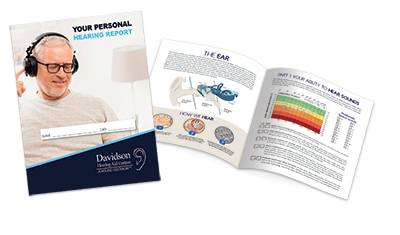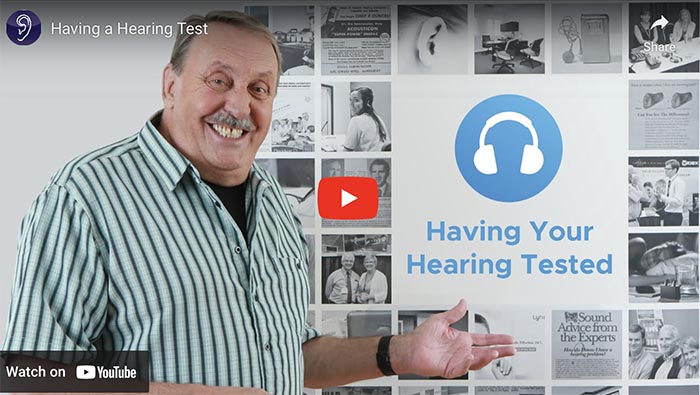Hearing Assessments
Check Your Hearing Online
Wondering if you have hearing loss? This online screener allows you to check your hearing in just 3 minutes. All you need is a set of headphones.
Hearing Loss Myths & Facts
The average person waits 7 years longer than they should before addressing their hearing loss. Here are some reasons why you should have yours checked sooner.
About Our Hearing Assessments
Think you should probably have a hearing test, but aren’t sure what all is involved? We outline everything to expect so that you are comfortable during your visit.

“Take it from me: Get your hearing checked. Life sounds amazing and you deserve to hear it all!”
Wayne Rostad
Spokesperson
Because hearing loss and hearing challenges develop at such a slow pace, most people are unaware of the day-to-day changes, which makes it difficult to know that you’re experiencing a hearing problem until it becomes a struggle to communicate.
As your hearing deteriorates, there are additional mental and physical health challenges like depression, anxiety, cognitive decline and balance disorders that begin to develop as well. Consequently, the earlier you seek the help of a licensed hearing healthcare professional for a comprehensive hearing assessment, the sooner you can learn the truth about your hearing and prevent these additional negative health issues.
Where do I go for a hearing test near me?
Our hearing healthcare professionals at Davidson Hearing Aid Centres will complete a series of assessments which will provide you with a thorough understanding of the impact your specific hearing loss has on day-to-day living. Through this comprehensive assessment, we’ll be able to work with you on your journey to better hearing.
Check Your Hearing Online
Wondering if you have hearing loss? This online screener allows you to check your hearing in just 3 minutes. All you need is a set of headphones.
Davidson’s Five Step Hearing Assessment Process
Step 1: Welcome to Davidson Hearing Aid Centres
As soon as you walk through our door, our friendly staff is ready to make you feel welcome. If you haven’t already completed the appointment forms online, one of our patient care providers will provide you with a physical copy of the necessary paperwork and a comfortable place to wait until it’s time for your consultation. If you have previous copies of your hearing test results or paperwork required for an employer or insurance provider, please provide them to our staff so that they can add a copy of them into your file.
Step 2: A Friendly Conversation
Our audiologists start our hearing assessments with a conversation about you, not because we’re nosey but because your family history, health history, the symptoms you are experiencing and your lifestyle (vocation, social life, hobbies and activities, etc.) can help us gauge your hearing loss experience, its impact on your quality of life and reveal possible causes. It also gives us an opportunity to respond to any questions or concerns you might have before we get started.
Step 3: Physical Ear Inspection
Using an otoscope (magnifying glass with a tapered tip and a light), your audiologist will conduct a physical inspection of your ears. This allows us to identify any physical obstructions that could be contributing to your hearing loss, like accumulated earwax, growths, damage to the ear canal or damage to the eardrum that might block sound from reaching the inner ear.
Step 4: Hearing Tests
After conducting a physical examination of your ears, we’ll move on to a series of non-invasive and painless hearing tests that are able to provide answers about the type of hearing loss you’re experiencing and its severity. Tests used might include:
- Tympanometry
- Pure Tone Audiometry
- Bone Conduction Test
- Speech Audiometry
- Speech in Noise Audiometry
Step 5: Discussing Your Results
As your results are captured in real-time during the testing process, your audiologist will present and discuss your test results during the same visit.
We’ll show you your audiogram, which is a graphic representation of your hearing capacity in each ear, and explain how each value relates to your specific hearing challenges. Along with discussing your results, your hearing care professional will provide you with a Personalized Hearing Report as well as treatment solutions to overcome your specific hearing challenges or preventative measures if you are at risk of developing a hearing loss.
As partners with you on your journey to better hearing, we provide solutions that meet your needs for better hearing while also considering your lifestyle, budget and personal preferences.
Hearing Loss and Hearing Test Myth Busting
We’ve heard plenty of reasons why people put off “getting their ears checked.” We also know that understanding hearing loss and what you can expect from a hearing evaluation can help alleviate any anxiety or stress you might be experiencing.
To head off the excuses and encourage you to come in for a hearing loss assessment, we’ve chosen to “bust” six common myths about hearing loss and hearing tests by providing the facts in order to set things straight.
Myth #1. My hearing loss doesn’t bother anybody.
Fact: In reality, you’re the one that is bothered most by your hearing loss because untreated hearing loss can lead to the development of mental health issues, like depression and anxiety, as well as other physical health problems, such as cognitive decline, vertigo, balance disorders and an increased risk of accidents.
Myth #2. If I have a hearing problem, I’d be the first to know.
Fact: The truth is that because hearing loss comes on at such a slow pace, you’ll probably be the last one to know that you’re struggling with your hearing. Family, friends and coworkers will recognize that you’re struggling with your hearing and suggest that you get some help.
Myth #3. I can just turn up the volume or ask people to talk louder when I can’t hear.
Fact: Only some hearing challenges are related to loudness. The majority are issues related to clarity, especially when it comes to sorting out conversations when there is background noise, difficulty understanding women and children or failing to distinguish between various consonants, such as th, s and f.
Myth #4. Hearing loss only happens to old people.
Fact: Individuals over age 70 experience the majority of hearing loss cases, but people of all ages can be affected by hearing loss that stems from any number of causes unrelated to age.
The primary cause of hearing loss in individuals under the age of 65 is noise induced hearing loss (NIHL), making it the second leading cause of hearing loss overall. Damage from noise exposure when you’re young hastens the pace of presbycusis (age related hearing loss) as you age, contributing to an earlier onset of hearing loss.
Myth #5. I really don’t want to wear hearing aids.
Fact: First of all, not all types of hearing loss are treated by using hearing aids. Hearing challenges for some individuals can be treated by removing built-up earwax or through treatment of other medical condition that may help restore hearing.
If hearing aids are the best solution to address your hearing challenges, today’s hearing aids are smaller, lighter, more discrete to wear, more powerful and much more user friendly than the bulky, frustrating gadgets your parents or grandparents wore.
Myth #6. A hearing loss assessment won’t tell me anything useful.
Fact: If you’re experiencing a hearing loss, a hearing test is the only way to accurately identify the type and severity of your hearing loss, and it provides the data necessary to develop an individualized treatment plan to address your specific needs.
Even if your hearing test shows no significant hearing loss, they are an important health screening assessment that establishes a valuable baseline against which future changes can be measured and allows our audiologists to provide you with equipment and advice on how to prevent future hearing loss.
Since hearing loss is often connected to other physical and mental health issues, like cognitive decline, balance disorders, depression and anxiety, early detection can help other physicians identify and correct issues that put you at risk of developing negative health conditions detrimental to your quality of life and independent lifestyle.
Watch as We Take Wayne Through a Hearing Assessment
In this short video, Robbie Davidson and Wayne Rostad will walk you through what is involved in having your hearing assessed as well as provide an example of what to expect at this appointment.
It is not a difficult or scary event and there is no pass or fail. The goal is to determine all of the sounds that you do hear as well as to get the best estimation of how you are performing in the real world.
Schedule a Comprehensive Hearing Assessment Today
Your first step to better hearing, whether you suspect you are experiencing a hearing loss or not, is to learn the truth by committing to an easy, non-invasive hearing evaluation. Together, you and your audiologist will identify the source of any hearing challenges and recommend solutions to address them.
Contact the Davidson Hearing Aid Centre nearest you for a comprehensive hearing assessment by submitting the adjacent form, and we’ll help you start your journey toward better hearing and a more active, independent lifestyle.
Common Tests Used to Assess Hearing Loss
Here is a list of the most common tests completed during a hearing test as well as a discription of each of them
Pure Tone Audiometry
Establishing your hearing threshold, or the lowest level you can hear various frequencies, helps us identify the type and severity of your hearing loss. The testing process involves the transmission of pure tones presented in descending levels from 250 Hz to 8000 Hz through the ear canal using headphones.
Speech Audiometry
Speech audiometry testing includes two different types of tests used to determine how your hearing loss affects your ability to understand speech.
Speech reception threshold testing (SRT) is used to establish the low-end threshold of speech reception, and it involves asking you to repeat spondee words (composed of two syllables pronounced with equal stress and effort) presented in descending levels.
The second test, your speech discrimination score, provides a percentage score of the number of phonetically-balanced words you can repeat correctly at a comfortable listening level.
Speech in Noise
While standard speech audiometry measures how well a person performs in quiet, performing a speech in noise test is extremely important to etermine how much difficulty the individual will have in real world situations.
Bone Conduction Test
Bone conduction testing, though similar to pure tone testing, bypasses the outer and middle ear and transmits sound signals directly to the inner ear through the surrounding bones. By comparing the results of your bone conduction test with your pure tone test results, your audiologist will be able to determine whether the type of hearing loss you’re experiencing is sensorineural or conductive.
Tympanometry

Get Your Personal Hearing Report
Unlike most places which just provide you with the technical “audiogram” report of your assessment, at Davidson Hearing Aid Centres, we will provide you with a personalized Hearing Report booklet. This 8 page book clearly explains the results of the different areas that were assesed in plain language. It also identifies the severity of potential difficulties that you might have in the real world. Along with discussing your results, your hearing healthcare professional will provide you with treatment solutions to overcome your specific hearing challenges or preventative measures if you are at risk of developing a hearing loss.
Your Hearing Report can also be shown to a spouse, family member or friend who might not have been able to attend your appointment. After reading through, they will better understand why you might be having difficulties in certain listening situations.



